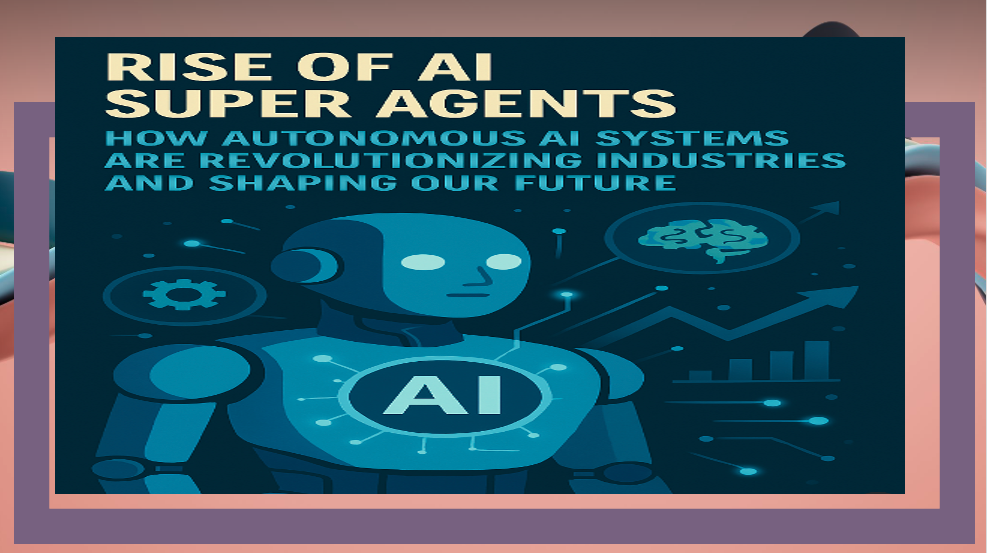Rise of AI Super Agents: How Autonomous AI Systems Are Revolutionizing Industries and Shaping Our Future.
In the rapidly evolving world of artificial intelligence, a groundbreaking trend is emerging—the rise of AI super agents. These advanced autonomous AI systems are not merely tools; they represent a new class of technology capable of independently performing complex, human-like tasks. From healthcare and finance to customer service and manufacturing, AI super agents are quietly yet profoundly reshaping industries, economies, and societies. But what exactly are these super agents, and how are they fundamentally transforming our world?
What Are AI Super Agents?
AI super agents are sophisticated, autonomous artificial intelligence systems designed to operate independently, without ongoing human intervention. Unlike traditional AI or chatbots, these super agents can analyze vast amounts of data, make decisions, learn from their experiences, and even interact seamlessly with humans or other AI entities. Equipped with deep learning, reinforcement learning, and neural networks, super agents continuously evolve, becoming smarter and more efficient over time.
Think of an AI super agent as an intelligent digital worker—one capable of not just automating repetitive tasks, but also independently handling complex operations that previously required human oversight or expertise.
How AI Super Agents Are Transforming Industries
Healthcare Revolution: AI super agents are rapidly becoming integral to healthcare, where they assist in diagnostics, personalized medicine, and patient monitoring. AI systems analyze medical images and patient histories faster and more accurately than human experts, reducing diagnostic errors and significantly improving patient outcomes.
Financial Sector Transformation: In finance, AI super agents manage investment portfolios, detect fraud, and predict market trends with unprecedented accuracy. Autonomous trading agents utilize real-time data to execute transactions faster than human traders, optimizing returns while mitigating risks.
Customer Service Reinvented: AI super agents are revolutionizing customer interactions, providing personalized, context-aware, real-time support. They can handle complex customer queries, provide tailored recommendations, and significantly enhance customer satisfaction and brand loyalty.
Manufacturing and Automation: In manufacturing, AI super agents manage supply chains, predict equipment failures, and optimize production schedules autonomously. This capability not only increases productivity but also reduces downtime and operational costs.
The Ethical and Social Implications of AI Super Agents
As AI super agents become more embedded in daily operations, significant ethical and social questions arise. Concerns about job displacement, data privacy, decision-making accountability, and the potential for biases embedded in AI algorithms are prevalent.
Job Market Disruption: With increased autonomy in decision-making and operations, AI super agents could potentially replace a wide range of skilled jobs, leading to economic disruption and social challenges.
Data Privacy and Surveillance: Autonomous systems require vast amounts of data, raising critical concerns regarding privacy, data security, and potential misuse.
Ethical Accountability: Determining accountability for decisions made by autonomous agents is complex. Who bears responsibility when an AI super agent makes a costly or harmful mistake?
Addressing these concerns requires stringent regulatory frameworks, transparency in AI decision-making processes, and ongoing ethical scrutiny to ensure AI serves humanity responsibly.
The Future: Opportunities and Challenges
The future of AI super agents is promising yet complex. As technology continues to evolve, these super agents will undoubtedly become even more sophisticated and pervasive, profoundly influencing economic and social landscapes.
Collaborative AI: Rather than fully replacing humans, the most likely scenario is increased collaboration between AI super agents and human workers, enhancing human capabilities rather than entirely supplanting them.
Regulatory Evolution: Governments and international bodies must quickly adapt regulations to manage the impact of AI super agents. Policies must balance innovation with ethical considerations and societal well-being.
Continuous Learning and Adaptation: Industries, educational institutions, and individuals must adapt to rapid technological shifts, emphasising lifelong learning and agility to remain relevant in an AI-augmented world.
AI super agents represent both unprecedented opportunities and significant challenges. Their potential to revolutionise industries, drive economic growth, and improve quality of life is immense. Yet, the societal implications cannot be overlooked. To harness the power of AI super agents responsibly, we must proactively address ethical concerns, embrace continuous learning, and cultivate a collaborative environment between humans and AI.
As we stand on the threshold of this transformative era, one thing is clear—AI super agents will redefine not only our industries but the very fabric of our daily lives. The question remains: are we prepared to embrace and guide this revolution wisely?

